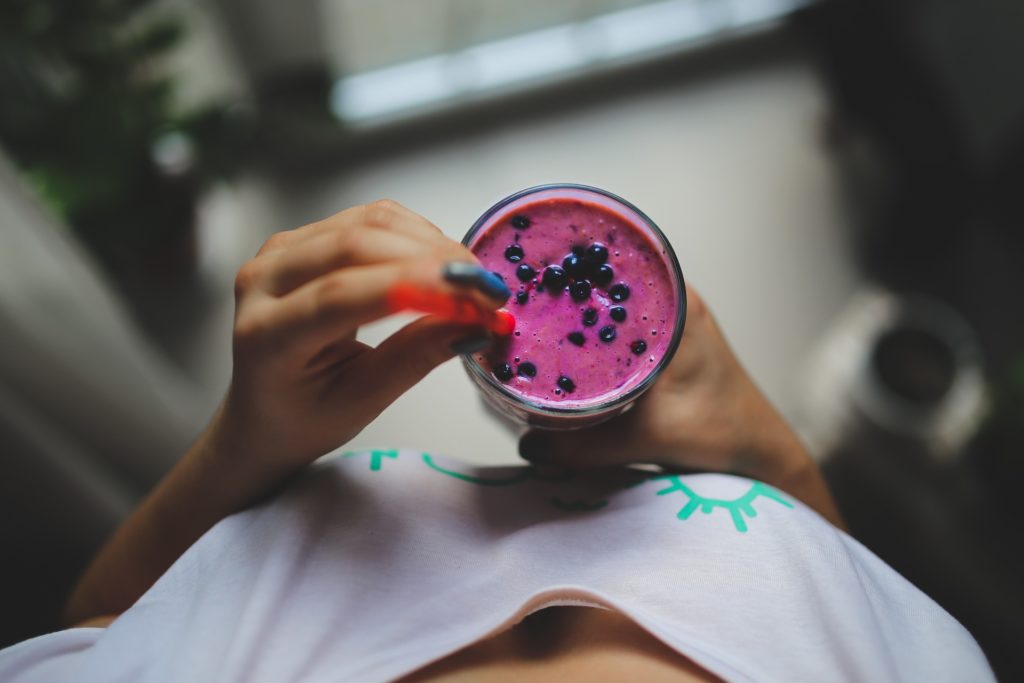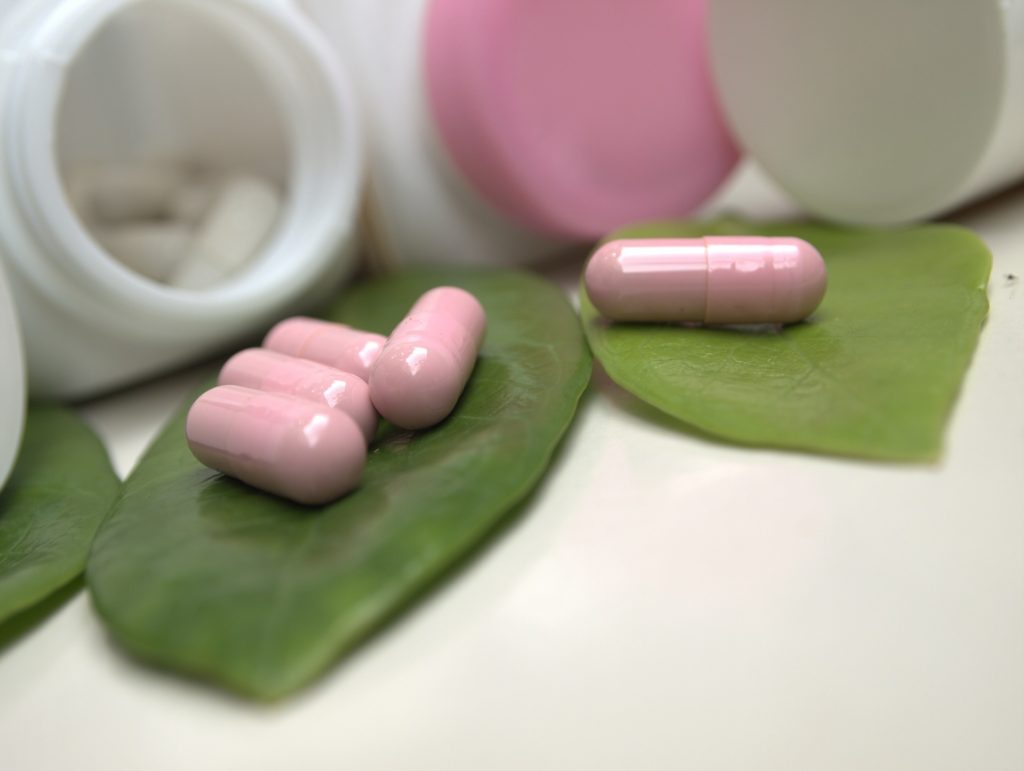I first started researching into probiotics when I noticed that my body started craving probiotic foods and drinks – yogurts, kefir, and others. I thought one of the reasons for this might be a lack of probiotics in my body.
I was already taking probiotic supplements, but, always striving to find right foods for me which will allow me to stop taking any supplements altogether, I was dedicated to find probiotic drinks and foods recipes!
After a short search (hurray internet!) I found a couple of recipes of different cultivated drinks – kombucha, water kefir, milk kefir, homemade cheese, and others. The recipes seemed quiet simple and quick to make, so I thought I would at least give it a try!
Now I am making a batch of water kefir and milk kefir every 3-4 days, and kombucha batch every few weeks! I noticed that my digestion improved considerably – I think at last my body got all the probiotics that it was craving!
Probiotics are bacteria that line your digestive tract. Their main functions are to help absorb nutrients from food and fight disease. There are 10 times more probiotics in your guts than cells in your whole body!
Their main functions are thought to be:
- support immune system and fight infections (though further studies need to made made into probiotics potential to help with immune health, read more here)
- support healthy digestion (you can find study here showing how probiotics can help with IBS)
- assist in beauty and health of skin. Interestingly enough, there might be a strong link between skin health and gut health (read here about “gut-brain-skin axis” hypothesis)
Other functions include:
- production of Vitamin B-12 (helps keep body’s nerve and blood cells healthy, assists in making DNA)
- production of Vitamin K (is crucial for many bodily processes, including building bones, preventing heart disease, and others)
- helps in production of butyrate (a fatty acid, important for normal functioning of your guts)
- decreases the number of bad bacteria, fungi, and yeast (ever heard of candida?) However, caution should be taken here – while sugary probiotic drinks do, indeed, increase the number of good bacteria which fight candida, due to high carbohydrate content, they also feed candida at the same time! Hence, if you are suffering from candida (or think you might be), I strongly recommend you to check with your doctor if you are O.K. to drink fermented sugary drinks. Indeed, if you are suffering from any conditions or/and are on medications, I would recommend seeing your doctor to discuss drinking any fermented drinks. Milk kefir (recipe coming up soon!) might be a safer solution from those who are, or might be suffering from yeast infections, but I would still check wit your doctor to make sure it is absolutely safe for you.
- creates enzymes (which are vital for digestion process and breaking down food)
- stimulate secretion of Immunoglobulin A, which is vital for immune function in mucous membranes (which line up many of the body’s cavities and tubular organs, including the gut and respiratory passages)
- stimulate secretion of regulatory T cells (vital for a healthy immune system functioning)
Some of the studies show that probiotics can help with the following:
- improve immune health (though more studies need to be made into probiotics’ ability to help the immune health)
- prevent antibiotic-related diarrhea (read more here)
- help skin conditions (read here about “gut-brain-skin axis” hypothesis)
- help digestions and heal inflammatory bowel conditions like IBS (you cn find a study here showing how probiotics can help with IBS)
- help with lactose intolerance (read more here)
- can help with food cravings due to rebalancing the gut flora
- can have a general cleansing effect on the body
- can potentially help with mood and mood-related issues due to re-balancing the gut flora. Indeed, some studies show that the gut health heavily influences the healthy brain functioning. “New studies show that bacteria, including commensal, probiotic, and pathogenic bacteria, in the gastrointestinal (GI) tract can activate neural pathways and central nervous system (CNS) signaling systems” (read more here).
- can potentially help with vaginal conditions (read more here)
- an improvement in gut and immune health can lead to increased energy levels and wellbeing
Did you know that 80% of your immune system is located in your guts? Indeed, healthy digestion and elimination seem to be some of the crucial factors in immune health. Furthermore, it is the second largest part in our neurological system (hence, also called our second brain!) There is a possibility that many diseases have their roots in problems related to digestive tract.
The healthy guts dependent on the right balance of good and bad bacteria. Toxins, environment, food we eat, and other factors might negatively affect our digestion and the delicate bacteria balance, causing problems with indigestion and others. That is why it is so important to take probiotics everyday.
There are so many probiotic supplements on the market today – probiotic drinks, capsules, pills. And they are all relatively easy to get. So why would you still want to consume fermented foods and drinks rather than a few capsules of probiotic supplement?
There are a few good reasons for it.
First of all,
“Fermented foods give you way more units of probiotics and strains of probiotics than a supplement ever will. When Dr. McBride tested the fermented vegetables, she found that her vegetables had trillions of probiotic units and over 30 strains, which means her one serving of fermented vegetables was equal to an entire bottle of probiotics.” (read more here)
Secondly, it seems that nature wisely has provisionally supplied all vegetables and fruit with a special type of preservative – Lactobacillus – which naturally preserves them, and makes fruit and vegetables perfect for fermentation (indeed, sauerkraut can keep up to 6 years provided it is covered in its own juice! You can read more here)
Another reason is that
“This process of fermentation does even more than preserve your food — it also makes the nutrients in the food more bio-available. According to Dr. McBride, the amount of bio-available vitamin C in sauerkraut is 20 times higher than in fresh cabbage!” (read more here)
Furthermore, fermented foods have been considered for over 5,000 years, so their effectiveness can be said to be proven overtime!
Also, you do not have to always remind yourself to take pills certain time after or before a meal (many probiotic supplements require you to take a few capsules or pills several times a day). Instead, you can just drink a bottle of kefir (or any other probiotic drink or food) – much easier to remember, and much more enjoyable (especially if consumed with some honey, granola, and berries!)
Lastly, making your own probiotic foods and drinks is often more cost-effective. it is also easy, and can be a fun and creative hobby!
Here I put a list of some of the most popular probiotic foods and drinks:
- Milk Kefir. Probably, one of the most well-known probiotic drinks! It has been consumed for more than 3,000 years. It has from 10 to 34 strains of probiotics, and possesses lots of health benefits. As the kefir grains break down lactose in milk, it is suitable for those with lactose intolerance. You can buy kefir in many health food shops, but I personally recommend making your own. In this case you can make 100% organic kefir, and it is often cost-effective and easy. The recipe for home-made organic milk kefir coming up in the blog soon – watch the space!
- Water Kefir. It is traditionally made using water, sugar, and water kefir grains. It does not contain dairy, so it is suitable for vegans, or those who do not consume dairy products. It has some of probiotics that the traditional dairy kefir has, but not as many, so if you are consuming dairy, I would recommend dairy kefir as a stronger option for packing your body with probiotics. I have never seen water kefir being sold in shops here in the UK (though there might be some shops that sell it), so I recommend making your own using water kefir grains (that you can get from your friend who ready makes water kefir, or from a reliable seller), water, and organic sugar. It is a very quick, easy, and cost-effective way to boost your probiotics consumption, plus it makes a tasty healthy fuzzy drink! Recipe for homemade water kefir coming soon!
- Cultures Yogurt or Greek Yogurt. Possibly, the most widely accessible probiotic food. The only problem is that you have to be very careful with yogurt’s quality – I would recommend to search for yogurts that are grass fed, organic, and without any additives – simple plain yogurts. Though for a greater boost of probiotics, I would recommend substituting yogurt with kefir – I now use my home made milk kefir in place of yogurt in some of my morning meals. I add nuts, seeds, berries, granola or muesli, and a bit of honey or maple and agave syrup, and it makes a perfect filling, probiotic-rich breakfast!
- Kombucha is fermentation of tea started with a SCOBY, a symbiotic colony of bacteria and yeast. Kombucha is believed to have been used for over 2,000 years, and is thought to have many health benefits including improved digestion, detoxification, and increased wellbeing. I personally found about kombucha when I was researching probiotic foods and drinks, and was amazed by the benefits that it might bring. I also found it relatively easy to make. The taste is quiet peculiar, but it is easy to get used to it overtime.
- Cheese is rich in probiotics, but only if it is raw (i.e. not made from pasteurised milk). I highly recommend organic and grass-fed milk cheese as in that case you get most of the benefits without the nasties (like antibiotics) associated with non-organic options. However, it is not suitable for those with lactose intolerance, vegans, or anyone who doesn’t eat dairy. Watch the space – recipe coming up soon!
- Miso has been used in Chinese and Japanese diets for over 2,500 years. I is made out of fermented soya beans, rice, or barley (interestingly, the fermentation can take from a few days to a couple of years!) Now widely available in shops and oriental cafes and restaurants (usually, in form of miso soup), it is relatively easy to get. Starting a day with a bowl of warm miso soup is believed to stimulate digestion. Making miso soup is very simple – you dissolve a tablespoon of miso paste (I highly recommend to look for certified organic miso soup paste) in a bowl of hot water with other ingredients of choice (usually, seaweed, vegetables, cooked meat or fish, tofu, and others).
- Sauerkraut (can never pronounce it correctly!) is very popular in Germany and Russia. It is not as rich in probiotics as other foods and drinks listed here, but has lots of organic acids which support the growth of good bacteria. It is also rich in Vitamin C and digestive enzymes, vital for healthy functioning of digestive system. I have never tried making it myself, mostly because it is widely available in Russia and I can easily get it from any food shop when I am there. Though as I moved to the UK, I could not find any places to get it from… Guess, I will have to start making it myself! 😉 Watch the space for the recipe!
- Kvass is another drink which is very popular in Russia and Eastern European countries (especially in summer!) It contains lactobacilli probiotics which are believed to have cleansing properties. It also has very pleasant sweet taste. It is usually made using fermented rye or barley. I have never seen it in any health food shops in the UK, neither did I try to make it myself, but anytime I go back to Moscow in summer I make sure to drink plenty of it – there are usually little kvass shops all over the city in summer, so it is a shame not to take advantage of it! If you have ever tried to make kvass yourself at home, or have seen it in shops in the the UK, please, share!
Even though I am a strong supporter of an idea that you should get most, if not all, of your nutrients from food (it is just the case of finding right type for you and high quality food), I admit that in some cases it can be very challenging, if not impossible, to get all the nutrients you need from food, especially if the community you live in does not provide you with those types of food you need and does not have organic options.
Also, I found that when I am travelling it can also be hard to get all the nutrients, for you probably would not have much time running around searching for specific foods you need – it is often the case with probiotic products, which, I find, are often hard to find whenever you go!
So in this case probiotic supplements can be a solution. The only thing you have to know is which probiotics type you are lacking, because in some cases taking a wrong type of probiotics can be negative for health.
The best thing you can do is to check with you doctor. Indeed, if you are suffering from any problems with digestion, I strongly recommend to go see your doctor, as he/she will be able to say which probiotics you lack and prescribe you the right ones. Furthermore, indigestion and bloating could be a sign of a more serious underlining issue, so it is always a good idea to double check with your doctor.
As with any type of food or drink, if you are unsure whether it is a right type of food/drink for you, it is always best to discuss with your doctor or nutritionist (or both!)
If you are taking any medications, suffering from any conditions, or are unsure about consuming any food or drink, please, check with your doctor or nutritionist prior to consuming it.
Are you taking probiotic foods or drinks? If so, which ones? Do you make them yourself, or get them from a shop/market? Or maybe you prefer probiotic supplements? Please, share YOUR probiotics story!



















